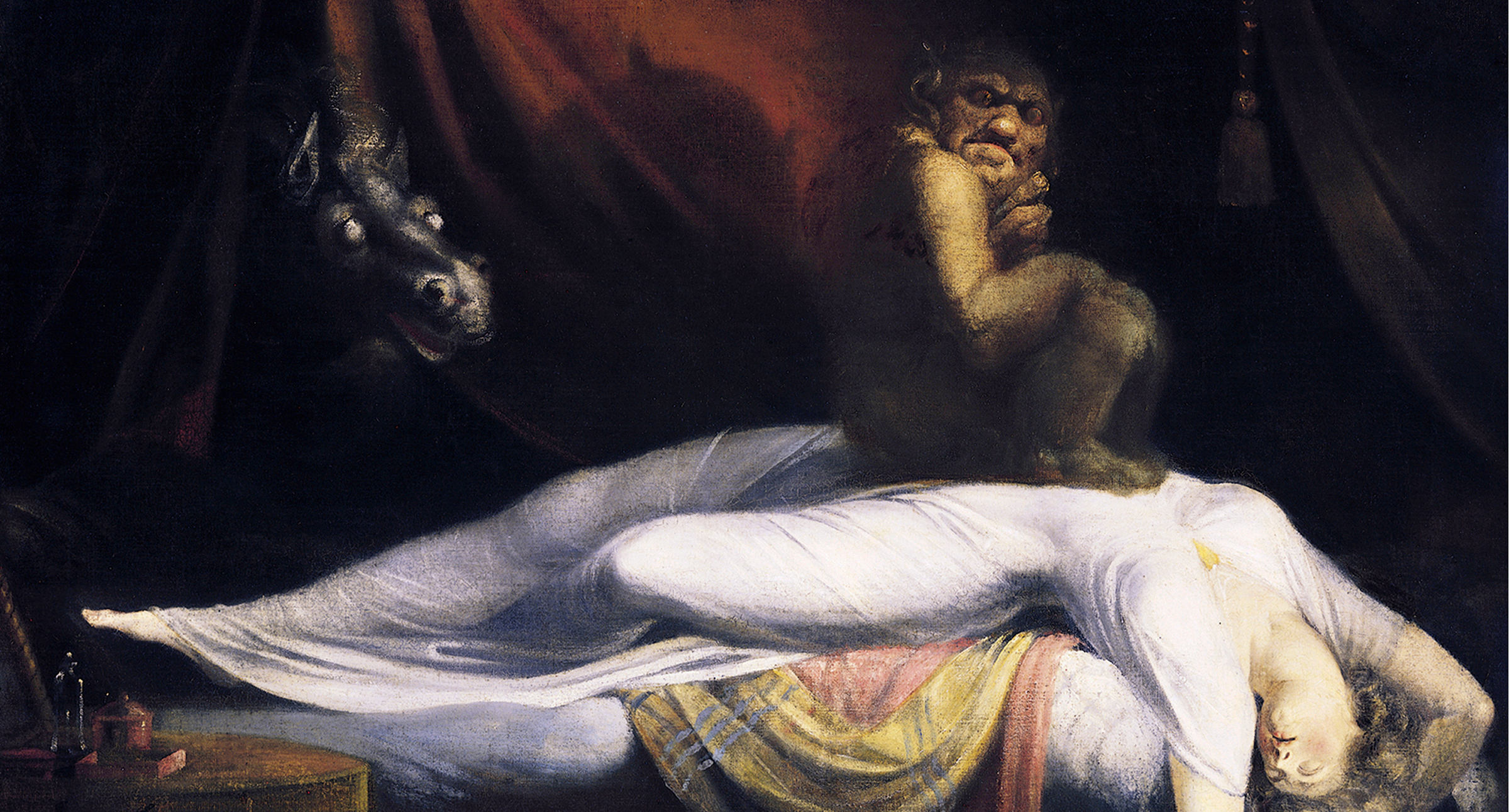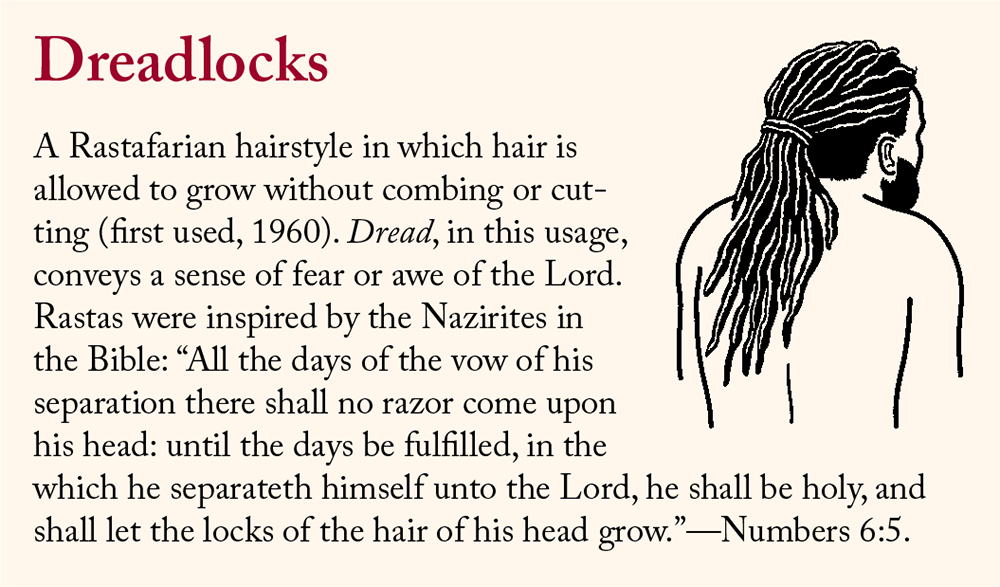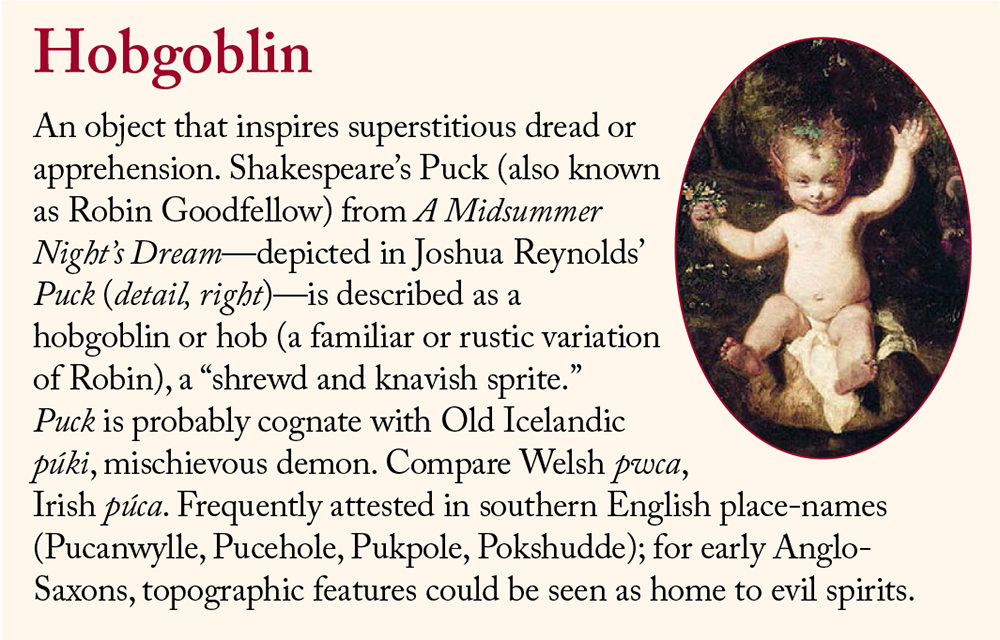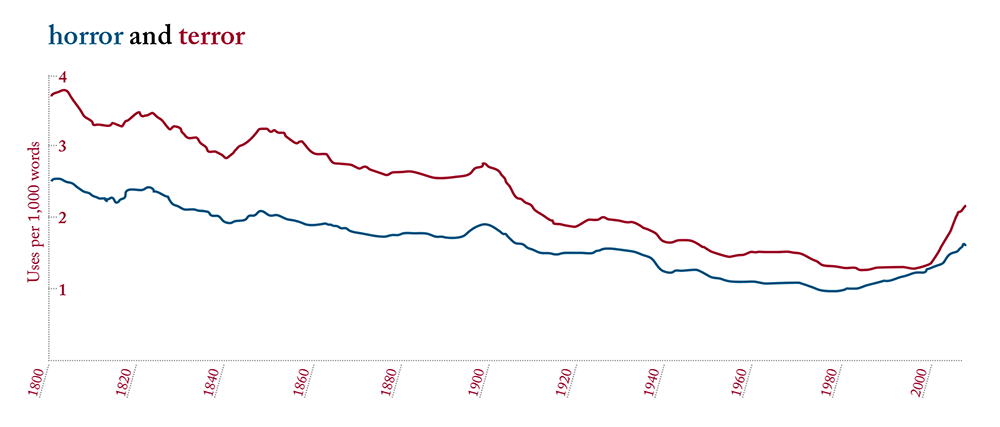
The Nightmare, by Henry Fuseli, 1781. Detroit Institute of Arts.
alarm: A state of sudden fear resulting from a perception of imminent terror. From Middle French à l’arme, alarme, “to arms!” as a warning of an attack. First used, c. 1378.
angst: A nonspecific fear of metaphysical insecurity. “Angst reveals nothingness.”—Martin Heidegger
anomie: Personal unease, alienation, and anxiety resulting from normlessness or a lack of accepted social standards and values. From French; first used in this sense by Émile Durkheim in Suicide (1897).
anxiety: “Temporal prosperity comes always accompanied with so much anxiety.”—John Donne, 1623
boggle: To start with fright or amazement; “to fear to come forward.”—Samuel Johnson, Dict. of the Eng. Language. First used, 1598.
boo: Used to express contempt or disapproval or to startle or frighten. From Middle English bo (1565); possibly related to Sanskrit bhū́ (भू), the act of becoming or rising. “God created the world by saying bhū́.”—John Rupert Firth
bravado: The assumption of courage in order to conceal timidity. “A sort of bravado, an air of affected unconcern.”—Jane Austen
bug: A bogey. From Middle English bugge, hobgoblin; probably akin to Low Germanbögge, goblin. “Thou shalt not nede to be afrayed for eny bugges by night.”—Psalm 91:5, Coverdale Bible, 1535.
coward: From Anglo-French cuard, possibly from cue, coe, tail. “One who in perilous emergency thinks with his legs.”—Ambrose Bierce, Devil’s Dictionary
creepypasta: A horror-related legend or image that is copied and pasted around the internet; a chain email of a ghost story. Examples include Slender Man, Jeff the Killer, Ted the Caver.
danger: (Obs.) The power of a lord or master; jurisdiction, dominion; also, the power to hurt or harm. From Old French dangier, Latin dominiarium, derivative of dominium, lordship, sovereignty.

fear: “We do not know the etymology of the word fear. That is, the makers of dictionaries are unsure of it. But there is a good chance that it is related to the word fare in its oldest sense, which is to pass through, to go through, as in, How did you fare at the dentist’s? or Fare-thee-well or, He fared in this life like one whose name was writ in water.”—Mary Ruefle, 2012
fearbot: Someone who makes all choices based on fear, mainly on the fear of powers that be or employers; a coward who never questions authority.
fearnought: A drink to boost one’s morale (1880). Cf. Tennessee courage, Jack Daniel’s whiskey, produced in Lynchburg, TN.
fraidycat: A person who is very afraid of something; a coward. From the aphetic form of afraid and cat (c. 1910–23).
frighten Friday: (Carib. slang) A timid person. From fraidy or Man Friday, the character in Daniel Defoe’s Robinson Crusoe (1719).
FUD: Marketing acronym for “fear, uncertainty, and doubt,” a strategy of disseminating negative information to discredit competitors.
gast: (Obs.) To frighten, alarm, terrify. From Old English gaestan, to torture, to destroy; from Old High German geist, Old Norse geisa, to rage; from Gothic usgaisjan, to terrify.

horror: A painful emotion compounded of fear and loathing. From Old French orror, Latin horrere, to bristle, shudder.
horripilation: A bristling of the hair of the head or body, as from terror; cutis anserina, i.e., goose bumps.
lì: 栗 Chinese for chestnut tree. Part of a compound word that means “fearful” or “anxious”; a chestnut dangling from a branch is said to provoke fear.
macabre: Tending to produce horror in a beholder. From Danse Macabre, dance of death; perhaps arising from II Maccabees 12:43–5. Subsequently, the word refers to anything grim or gruesome.
mal de pelea: Spanish for “fighting sickness.” A culture-specific dissociative syndrome of spectacular hysteria; a.k.a. Puerto Rican syndrome, “a group of striking psychopathological reaction patterns, precipitated by minor stress.” See susto.
mammet: (Arch.) A scarecrow. From Anglo-Norman maumet, Old French mahomet, mahommet, an idol (12th cent.), a use of Mahomet, resulting from the medieval Christian belief that the prophet Muhammad was worshipped as a god.
monster: A threatening force. Middle English monstre, Old French mostre, prodigy, marvel (later, a disfigured person, a misshapen being; c. 1223, in extended sense, applied to a pagan); from Latin monstrum, omen, portent, prodigy, wicked person, atrocity; from monere, to warn.
Mutterweh: German for “mother’s pain”; hysteria, hysterical affection, Hysterica passio. Also refers to labor pains or hysteralgia.
ophidiophobia: An irrational or abnormal fear of snakes; from Greek ὄφις, snake, and φοβία, fear.
phobanthropy: A morbid dread of mankind.
poltroon: A worthless or cowardly person; from French poultron, Latin pullus, the young of an animal. Similar to pullet and poultry. Claudius Salmasius suggests (1640) a possible derivation from the Latin phrase pollice truncus, maimed or mutilated in the thumb in order to avoid military service.
pusillanimity: A lack of courage or fortitude. From Latin pusillus, very small (diminutive of pusus, boy) and animus, spirit. Cf. puerile.
scarehead: A puritanical religious preacher.
scared shitless: (Vulg.) Extremely frightened. First used, 1924.
screamer headline: A large and sensational newspaper headline designed to convey terror.

susto: A destabilizing folk illness marked by fright or sudden fear, esp. of losing one’s soul or shadow. See mal de pelea.
threat: An expression of intent to inflict evil, injury, or damage. From Middle English thret, coercion; akin to Middle High German droz, annoyance, and Latin trudere, to push or thrust. First used before the 12th century.
tremendous: “That is much to be feared, dreaded.”—Nathan Bailey’s Dictionary, 1730
trepidation: A nervous or fearful feeling of uncertain agitation. From Latin trepidare, to tremble, trepidus, agitated. Probably akin to Old English thrafian, to urge, push, and Greek trapein, to press grapes.
worry: To kill a person or animal by compressing the throat, to strangle; also, to bite, to utter words with teeth nearly closed. From Old English wyrgan, Old Frisian wergia, to kill; from Middle Low German wogen, to strangle, throttle.
Explore Fear, the Summer 2017 issue of Lapham’s Quarterly.